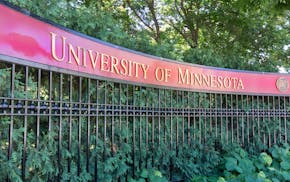A legal battle is brewing over Dakota County's return to collecting DNA samples from people who have been charged with certain violent crimes but not yet convicted.
The Sheriff's Office resumed the practice, previously ruled unconstitutional by the Minnesota Court of Appeals, in August on the advice of County Attorney James Backstrom. He said a 2013 U.S. Supreme Court ruling that upheld pre-conviction DNA collection "effectively overturned" the state ruling.
But almost immediately, the Minnesota Board of Public Defenders mounted a challenge. Attorneys began asking judges to block the DNA collection in individual cases, claiming it's an unreasonable search and seizure. The effort has so far prevented DNA collection from at least eight of the 24 people booked since August who met the criteria to submit a sample, said Dakota County Sheriff Tim Leslie. Several other cases have motions pending.
In response, Backstrom filed a petition with the Minnesota Court of Appeals this week, asking the state to stop the judges from interceding. District judges do not have standing to intervene in a process unrelated to the case's criminal charges or evidence, he said, and prosecutors can't appeal the procedural motions.
"We welcome a legal challenge in this process," Backstrom said. "We have no problem going up and arguing why the statute is constitutional, but we need a forum to do that and we do not have that right now."
Public defenders leading the opposition argue that the DNA collection violates their clients' constitutional rights. The U.S. Supreme Court dealt with a Maryland case, and the defenders say the 2006 Minnesota Court of Appeals ruling should apply here. That 2006 opinion says the privacy of a person not yet convicted is "not outweighed by the state's interest in collecting a specimen for DNA analysis."
'Let's figure this out'
State Public Defender Bill Ward said Backstrom and Leslie decided "that they are going to take the law into their own hands."
"They're trying to build a database with someone only arrested on suspicion," Ward said. "They're just taking [the DNA] because they can."
Dakota County sends the DNA samples to the Bureau of Criminal Apprehension, which enters the information into the FBI's Combined DNA Index System (CODIS), where it can be compared with DNA obtained from crime scenes and victims nationwide. So far, Leslie said, the pre-conviction samples haven't provided any hits.
Backstrom argues that the DNA collection could also help identify people in the jail and possible connections to past crimes. That could affect how bail is set or reveal that someone is a flight risk, he said.
To this point, there hasn't been consensus on the subject among Dakota County judges. While some have issued orders precluding DNA collection, others have chosen not to. A handful of judges have also asked for more information from parties.
At least two cases being argued by the public defenders involve defendants whose DNA was collected before their attorneys asked for an order from a judge. They now want those specimens destroyed. Attorneys are expected to argue the issue in court next week.
"Let's figure this out," Leslie said. "Let's push this envelope a little bit and see what the court wants us to do."
A spokesman for the state court administrator's office said no judge could comment on "cases, controversies, or issues that are likely to come before the court."
What's next?
A favorable ruling for Dakota County from the Court of Appeals could effectively end defense attorneys' efforts to block DNA collection by getting orders from judges.
But William McGeveran, an associate professor at the University of Minnesota Law School, said such a ruling wouldn't necessarily be a predictor of how a fight over the constitutionality of pre-conviction DNA collection would unfold. "It's a way of keeping DNA collection in place and leaving for another day the fight over whether this is allowed," he said.
Though the U.S. Supreme Court ruled on the issue in 2013 in the Maryland case, it is possible for the Minnesota Supreme Court to decide that the state's Constitution offers greater protection to citizens. But, McGeveran said, the court can be reluctant to do so.
That is something Backstrom is counting on.
"We would hope the U.S. Supreme Court precedent would be followed," he said. "We're happy to have this matter reviewed by Minnesota Supreme Court, but it needs to be challenged in an appropriate way."
Stephen Montemayor • 952-746-3282
'Human error' behind Robbinsdale shelter-in-place alert that was mistakenly sent countywide

Going to Wolves or Twins tonight? How to get there (and maybe avoid traffic).
Focusing on bringing football film into frame
